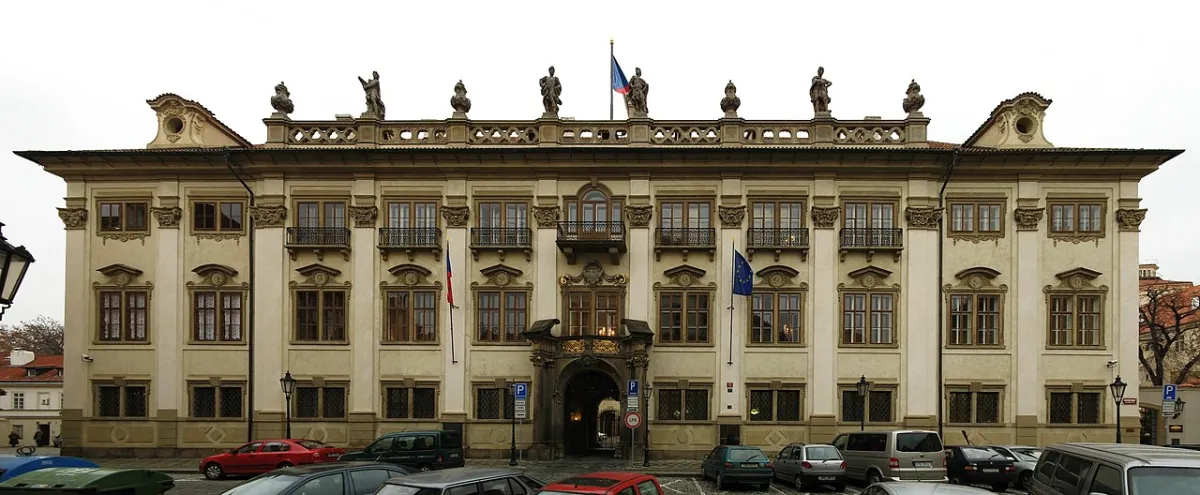
by Massimo Introvigne — When Petr Pavel was inaugurated as the new President of the Czech Republic in March 2023, he vowed to align the country with European Union human rights standards. He also emerged as a staunch critic of the human rights violations in Russia. Some developments with respect to small minority religions were in fact regarded by local human rights activists as hopeful.
However, these hopes have now been shattered by an unprecedented move by the Czech Ministry of Culture. It appears that the Czech Republic still maintains among its laws a statute on “religious freedom” dated January 7, 2002, which includes some draconian Russian-style, or perhaps Soviet-style, provisions on the “liquidation” of religious organizations. According to this law, “a church is formed as a legal entity by registration” (article 6.1). Registration can be denied and, once obtained, can be lost, including if the church’s activity are deemed to be “in violation of the law” (article 22.1.c).

The Czech Ministry of Culture, Prague. Credits.
This is a vague provision, but the consequences are not vague at all. If it believes that a “violation of the law” has occurred, “the Ministry shall, prior to initiating de-registration proceedings, instruct the registered church or association of churches to cease and desist from engaging in such unauthorized activities. Should the registered church or association of churches continue to engage in said activities, the Ministry [of Culture] shall initiate its procedure for de-registration” (article 22.2).
“The registration of a church or an association of churches is terminated when the Ministry’s decision to de-register becomes effective” (article 24.1). “Upon the de-registration of a church, the church and all of its recorded church legal entities shall be liquidated” (article 24.2). Liquidators will be appointed and they “shall notify the Ministry of the conclusion of liquidation proceedings within five business days of said conclusion” (article 24.5). Unless the liquidated church had previously indicated another church to which the proceeds of the liquidation should be transferred, “the net proceeds shall accrue to the State, which shall use the net proceeds for the benefit of other registered churches” (article 24.6).
Happily, these draconian provisions are rarely applied. However, on September 5, 2024, the Ministry of Culture sent to the Czech Religious Association of the Jehovah’s Witnesses (RAJW) the cease and desist letter mentioned in article 22.2. The Ministry gave to the RAJW three months for ceasing and desisting from certain “activities,” warning them that if they do not comply within the term the de-registration proceedings will be initiated. Various meetings between representatives of the Jehovah’s Witnesses and the Ministry failed to resolve the issue. On November 26, the Jehovah’s Witnesses received confirmation that the cease and desist letter stands. Since on December 5, the three-month period ended, they are currently waiting for an official communication from the Ministry about the initiation of the deregistration proceedings.

In 2023, the Jehovah’s Witnesses celebrated 100 years of publication of “The Watchtower” in Czech language. Source: JW.org.
The “activities” the Ministry regards as illegal are all features of the Jehovah’s Witnesses’ teachings and lifestyles that have been examined by courts of law throughout the world and regarded as lawful and protected by domestic and international principles of freedom of religion or belief, with the exception of Russia and partially of Norway. In the latter country, however, a court decision is under appeal and does not threaten the Jehovah’s Witnesses with liquidation but “only” (between brackets, because these are serious limitations of their religious liberty) with the loss of state subsidies and certain other faculties, including the possibly of celebrating legally valid marriages.
The first and second objections of the Czech Ministry deal with the same matter being litigated in Norway. It is alleged that by teaching the practice of counseling members not to associate with ex-members (except cohabiting relatives) who have been expelled as guilty and unrepentant of serious sins or have publicly disassociated themselves from the organization, the Jehovah’s Witnesses violate the right of their members to change their religious beliefs. The fear, it is argued, compels members who would like to leave to remain in the organization.
The second objection adds that this is even more dangerous when “children” (meaning minors) are expelled, or they remain within the Jehovah’s Witnesses but are prevented from associating with friends and relatives who have been expelled or have publicly left the organization. The Czech Ministry’s letter does not clarify whether any minor was expelled in the Czech Republic. Cases of expulsion of minors are indeed extremely rare.
This matter has been litigated in a good dozen of countries, resulting in decisions unanimously favorable to the Jehovah’s Witnesses, except (as mentioned earlier) in Russia and in a non-final decision in Norway. Courts have observed that in fact nobody can be compelled to associate with persons, including relatives, they no longer want to associate with, and that suspending relationships is a common fact in our societies as a consequence of all sorts of quarrels. Former spouses and other relatives often cease relationships with divorced ex-spouses. In fact, opponents do not ask courts to compel Jehovah’s Witnesses to associate with expelled or apostate ex-members, which would be practically impossible, but to prohibit the Jehovah’s Witnesses from teaching that relationships should be suspended.
However, in some form, that relationships should cease is clearly taught in the Bible in 1 Corinthians 5:13 (“Expel the wicked person from among you”) and 5:11 (“Do not even eat with such people”), and 2 John:10–11 (“Do not take them into your house or welcome them. Anyone who welcomes them shares in their wicked work”: all quotes from the New International Version). How to read these passages is a matter of Biblical interpretation that cannot be adjudicated by secular courts without a gross violation of freedom of religion.
The third charge is that the Jehovah’s Witnesses use “psychological coercion to create dependency, which leads to psychological harm to individuals or their family members or damage to their social relationships.” By reading the explanatory part of the cease and desist letter, it seems that “psychological coercion” is allegedly practiced by avoiding relationships with expelled or apostate ex-members, which would make the third charge a duplicate of the first. On the other hand, the charge itself uses the language of the discredited theory of “brainwashing” or “psychological subjection” allegedly used by religious movements, debunked since the past century by mainline academic scholars of religion and rejected by courts of law in most democratic countries (with the exception of France, whose campaigns against “cults” have received widespread international criticism).
The fourth charge relates to the question of blood transfusions to minors, including in cases when they are “necessary to save the child’s life.” Again, the letter does not mention whether specific incidents happened in the Czech Republic.

The Czech remote translation office of the Jehovah’s Witnesses in Horní Bludovice. Source: JW.org.
The Czech Ministry failed to consider that in most democratic and medically advanced countries the issue is becoming moot as hospitals can provide appropriate care that does not involve a blood transfusion. On their official website, Jehovah’s Witnesses refer to various medical studies showing that “patients, including children, who do not receive transfusions usually fare as well as or better than those who do accept transfusions.” When Jehovah’s Witnesses wish to receive assistance in finding doctors who can provide bloodless treatment, they can seek the help of Hospital Liaison Committees, which have been established for this purpose.
In most democratic countries, courts—including the European Court of Human Rights in 2010 (“Jehovah’s Witnesses of Moscow and Others v. Russia,” June 10) and 2022 (“Taganrog LRO and Others v. Russia,” November 22), and the Italian Supreme Court of Cassation in 2020 (3rd Civil Session, decision of 4–23 December 2020, no. 29469)—have ruled that adult patients have a right to refuse any medical treatment and protected the right of the Jehovah’s Witnesses to refuse blood transfusions. In several jurisdictions, this also applies to “mature minors.”
As for minors who are not “mature,” in the rare cases when doctors believe a blood transfusion is absolutely necessary, and parents or guardians would not authorize it, that dispute can be resolved by a court. In such a case, a parent who is one of Jehovah’s Witnesses will respect the decision made by the court. Courts in democratic countries have also recommended that such measures are adopted only exceptionally. As stated in the Canadian appeal court decision of “M. (J.) v. Alberta (Director of Child Welfare)” (2004 ABQB 512, para. 43), the State “must be careful not to presume that the doctor has always recommended the only acceptable treatment and that Jehovah’s Witness parents are always wrong in denying their consent for treatment by way of blood products. Such a paternalistic attitude impairs the parents’ [constitutional] rights…” In Italy, one of the countries with the largest per capita population of Jehovah’s Witnesses, courts have held that by choosing medical alternatives to blood transfusions, parents who are Jehovah’s Witnesses are not displaying “parental inadequacy,” but are instead conscientiously exercising constitutional rights afforded to all parents (Minors Court of Genoa, no. 1109/19, 6 May 2019; Minors Court of Milan, no. 1110/2014, 15 January 2014).

Literature display cart of the Jehovah’s Witnesses during the Ice Hockey World Championship, held in the Czech Republic in 2024. Source: JW.org.
The Jehovah’s Witnesses are asked to cease and desist from certain “activities.” However, they cannot cease and desist from their teachings about avoiding relationships with expelled members and blood transfusions, because they believe that these are mandated by the Bible, that the Bible is the word of God, and that Christians “must obey God rather than human beings” (Acts 5:29, New International Version). They are not alone in this attitude. When Australia (and other countries) passed laws compelling priests to breach the secret of confession and report to the police penitents who confessed sins of child sexual abuse, the Vatican promptly instructed Australian bishops and priests that they should refuse to do so and if necessary go to jail rather than breaching the confessional seal that for Catholics comes from God.
The attitude of the Czech authorities is also discriminatory, since several other religious organizations have similar or harsher provisions about relationships with expelled or “apostate” ex-members.
In the Czech Republic the Jehovah’s Witnesses are offered the alternative of renouncing beliefs that are part of their interpretation of the Bible, thus “disobeying God,” or being de-registered, having their assets liquidated, and being put in the impossibility to operate as a religious organization. That this happens in Russia is unfortunately normal. It is a scandal when it is proposed in a democratic country and a member state of the European Union. It should not be allowed to happen.
Souce: Bitter Winter





